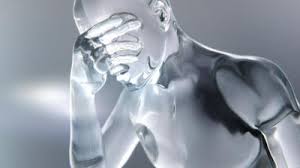
Who are we online?
We use the smartphone, tablet and laptops. We explore the digital sphere and create an image of ourselves in the digital world.
Who are we online? What are we creating? What are we doing there? What are the advantages of our actions? What do we gain? Why are we magically drawn to it?
The Internet defines our I?
Identity is what makes a person unique. This can be optical and physical features, for example the fingerprint or the iris of an eye, or personal data such as name, place of residence and date of birth. Certain characteristics are recorded in a passport to uniquely determine a person’s identity. This is where the name Identity Document (ID) comes from.
In Estonia, for example, every citizen has an electronic identity. This gives them access to a central administrative account.
However, as stable as the identity-giving characteristics may be, the identity is itself volatile on the Internet. We change, again and again. Try things on the Internet and put them down again when we don’t like them (anymore). Our behaviour is the reflection of our soul. So identity on the Internet is the present, it characterizes the current action of us.
Just like in the analogue world, we also leave digital traces.
- Which website we look at
- Which App we use
- How we shop
- What we are looking at
- How we communicate
says a lot about what we like and who we are. This change of information is an important part for „data octopus/data collectors“ to examine us. We constantly build (self-discovery) spaces in the virtual world and redesign them.
Communication – We create ideas of ourselves!
Philosophers are of the opinion that the sum of relationships is the résumé of our identity (source 1) and that the self is developed through communication. It is the result of living together.
We define our self through relationships with other people. Digital technology can help – on the one hand via social networks such as Facebook, WhatsApp or Twitter – which digitally map social structures, on the other hand via communication technology with which we exchange ideas without sitting opposite each other. In the first case, companies and their algorithms determine how the structures should look, and often we think you’re right. We don’t think about it much anymore.
Translators break down even language barriers and expand our field of communication.
Our ME forms itself, adapts to it and determines consciously or unconsciously our self.
But does the human being no longer need personal direct relationships?
Technology contributes to rapid locomotion.
Our little helpers (smartphones) determine the location, the route, the directions quickly and reliably.
GPS data, type of locomotion and height measurement data are processed. Our little „phone“ (which is no longer just a telephone) has a multitude of sensors to determine the respective position optimally. The best or fastest route is calculated in seconds. Billions of people worldwide use positioning and navigation systems. Why should we wander around when we can have the direct route displayed.
It also stores where we sleep. Which helpers are around and who we meet. Furthermore, data from different smartphones are combined, for example to determine a traffic jam. In doing so, a precise statement about duration and possible delays is calculated.
The digital world therefore knows our whereabouts and our movement data.
Buying and paying is (becomes) digital and personal.
In Germany, cash is (still) the most common means of payment. But more and more people are using digital money. Companies – such as wirecard or PayPal – say that the use of electronic payment services is growing rapidly. But mobile payment services are also becoming increasingly popular (e.g. ApplePay). Almost all banks now offer this service.
The transaction can also be personalized. For example, users can collect points with each payment in the context of meeting programs, which can be used to take advantage of other offers from merchants.
Our buying behaviour says a lot about ourselves. Also about our state of health or our social life.
Who are we online?
Play and entertainment.
Entertainment has become so easily available in the digital world. Precisely cut and selected. Providers believe they know what we want to see and play. Netflix describes it this way: „Our website adapts to the individual taste of the user“(Marc Randolph – founder of Netflix).
With every series seen, with every movie watched, the provider learns more about the preferences and also dislikes of the viewers. So personal data is collected and evaluated to be able to make the best offer.
Netflix is not alone:
- Apple TV.
- Amazon Prime
- Disney
- Joyn
- MagentaTV
…get in line here.
Google recently launched STADIA. A platform for streaming and video games. Apple followed suit.
The digital I/SELF
It is only a rough cross-section of what data is processed by us. Nevertheless it shows very clearly that we create a digital ICH in addition to our analog (real) self.
Striving is currently still analog.
But what happens to our digital life? Is the digital identity not already real life. Those who cannot be found on the Internet today have a harder time choosing a career. Anyone who does not have Internet-capable devices today is already written off socially. As a result, we are currently living in a digitalised world.
It’s up to us. We can decide for ourselves which digital values stay on the Internet and which image we leave behind.


